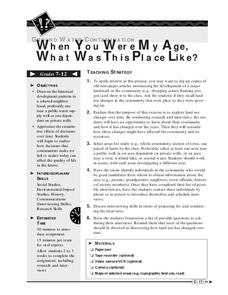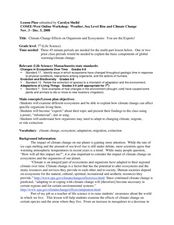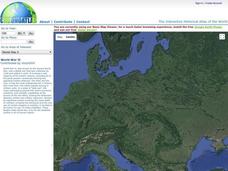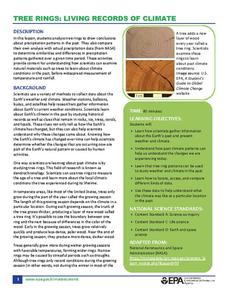PBS
Racial Equality: How Far Have We Come and How Far Do We Have To Go?
Is everyone treated fairly in America? The culminating fifth instructional activity from a series of five has pupils explore racial inequalities from the 1960s and decide whether or not society has changed over time. The instructional...
Main Memory Network
Longfellow's "The Village Blacksmith" and Whitman's "Song of Myself"
Although the work Americans do has changed over time, the plight of the American worker has largely remained the same. Facilitate a class discussion aboutAmerican workers using Henry Wadsworth Longfellow's "The Village Blacksmith" and...
Curated OER
Key Ingredients: America by Food
Students participate in a series of activities to explore the types of food Americans eat, how food choices differ in various parts of the country, and how the availability of various foods has changed over time.
Teach Engineering
Active and Passive Transport: Red Rover Send Particles Over
I can move about freely, but you cannot. The class models the movement through cell membranes by way of passive and active transport. Members of the class play the roles of various proteins, atoms, compounds, and cell actions and mimic...
Curated OER
Reading Graphs
Working independently or in teams, your class practices connecting graphs, formulas and words. This lesson includes a guided discussion about distance vs. time graphs and looking at how velocity changes over time.
Consortium for Ocean Science Exploration and Engagement (COSEE)
Ocean Acidification: Whats and Hows
Open this instructional activity by demonstrating the production of acidic carbon dioxide gas by activated yeast. Emerging ecologists then experiment with seashells to discover the effect of ocean acidification on shelled marine...
US Environmental Protection Agency
Sea Level: On the Rise
With the global temperature on the rise, the effects of climate change are starting to be seen. However, many people have a difficult time conceptualizing the long-term effects, such as sea levels rising. Given an easy and effective...
Curated OER
Trees: Recorders of Climate Change
Middle schoolers study cross sections of trees or tree "cookies" to discover how the rings on tree sections give clues to the climate during the time the ring was produced. They study simulated cross sections of trees to determine the...
Curated OER
Changes in Latitudes, Changes in Attitudes
Sixth graders discuss how people, society, and technology change over time through a unit of integrated lessons. In these changes in society lessons, 6th graders discuss the answers to many questions about how changes effect the...
Curated OER
When You Were My Age, What Was This Place Like?
Students discover how land use in their community has changed. In this community and ecology lesson, students scan old newspapers to find articles about the development of community land. Students discuss and predict how land use has...
Curated OER
Climate Change Effects on Organisms and Ecosystems: You are the Experts!
Seventh graders research about the effect of climate on different ecosystems. In this life science lesson, 7th graders present their research by creating a poster, infomercial, skit or song. They discuss how organisms adapt to climate...
Curated OER
You Are What You Wear
Students, after analyzing interactions between groups/societies, effects of causality/change over time, forms of imaginative writing and utilizing art media to conveying messages/meaning, examine the relationship between clothing and...
Curated OER
How Many Penguins Does It Take? Studying Carrying Capacity and Limiting Factors
How does a population's habitat determine the size of that population? Teach learners about carrying capacity and limiting factors with an engaging roleplay activity. Class members pose as a colony of penguins who must gather food amidst...
Curated OER
The Climate Change Skeptic's Argument: Natural Solar Cycles or Human Activity?
Teachers explore patterns in sunspots and total solar irradiance to understand the counterpoint to the human effect of global warming. In this professional development tool, teachers work through a lesson on the sun's natural patterns to...
Curated OER
Introduction to Earth's Dynamically Changing Climate
Students identify the most common causes of global warming. In this earth science lesson, students use an interactive website to explore changes over time in sea ice, sea level, carbon emissions, and average global temperature. They take...
Illustrative Mathematics
The Price of Bread
As part of an initiative to strengthen our young adults' financial understanding, this problem explores the cost of bread and minimum wage since the 1930s. Learners are asked to find the percent increase from each year and compare it...
US Environmental Protection Agency
Tree Rings: Living Records of Climate
Open with a discussion on weather and climate and then explain how tree rings can provide scientists with information about the earth's past climate. Pupils analyze graphics of simulated tree rings from various US locations for the...
Teaching Tolerance
Why Do We (Still) Celebrate Columbus Day?
What are we really celebrating on Columbus Day? The resource explores the narrative behind Columbus Day and ways for people to change the perception. Scholars also review vocabulary terms associated with the topic and how attitudes have...
New York City Department of Education
Geography and Early Peoples of the Western Hemisphere
Young historians discover the early people of the western hemisphere. The unit explores how the land changed, how it was used and homes of early Americans such as Incas, Mayans, Inuits, Aztecs, and Pueblos. Individuals also examine these...
Utah Education Network (UEN)
Utah Open Textbook: 7th Grade Science
Physical and biological factors affect everyday living. Scholars explore electromagnetic forces, motion, the rock cycle, and geological changes. They examine cells as the building blocks of life and how organisms reproduce using images...
DocsTeach
Integration of the US Armed Forces
Uncle Sam wants you to integrate the military! The activity uses images and documents to help scholars understand the integration of African Americans into the mainstream military. Academics analyze a series of military photos and...
Curated OER
Introduction to Ozone Reading Activity
Simple, but suitable, this instructional activity gives mini-meteorologists a glimpse at ozone in the atmosphere. By reading an article, they find that ozone in the stratosphere is vital to life, but ozone in the troposphere is...
Media Smarts
Selling Tobacco
Take a look at tobacco advertising techniques through the decades. Students analyze the differences in strategies, and write an essay on the advertising history of one brand of tobacco, how tobacco advertising has changed over time, or...
Curated OER
Full Esteem Ahead
Does having higher self esteem encourage learners to take better care of themselves? It absolutely does! Does having high self esteem mean that one likes everything about themselves? No, but that they like most things and can work to...
Other popular searches
- Landforms Change Over Time
- Communities Change Over Time
- Families Change Over Time
- Community Change Over Time
- Ecosystem Change Over Time
- Change Over Time Art
- Biological Change Over Time
- Change Over Time Map
- Graph Change Over Time
- Temperature Change Over Time
- Character Change Over Time
- Change Over Time Math

























